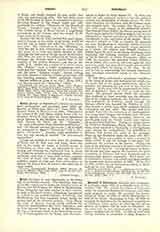

Berno (APOSTLE OF THE OBOTRITES), in the latter half of the twelfth century. The Obotrites were one of the Slav tribes known under the common name of Wends, and dwelt along the Baltic in Mecklenburg. Three bishopics had been erected in their country as early as the tenth century, Oldenburg (transferred to Lubeck in the twelfth century), Ratzeburg, and Mecklenburg, but they remained vacant duringt the greater part of the eleventh century. Duke Henry the Lion, of Sacony, having partly subdued the Obotrites, reestablished the three bishopries, and in 1155 selected Berno as Bishop of Mecklenburg. He was a Cistercian monk of the flourishing monastery of Amelungsborn on the Weser, and was consecrated in Rome by Pope Adrian IV. As these sees were not only episcopal residences but also political centers and strongholds of foreign power, the Obotrites identified the Christian with the German name and detested both. No wonder that Berno at first met with small success in his missionary labors. The Obotrite Prince Niklot, the fiercest enemy both of the Germans and of the Christian religion, had not yet submitted to German ascendency and was the greatest obstacle to the conversion of the people. Berno was even obliged in 1158 to transfer his episcopal see from Mecklenburg to Schwerin, whither German colonists had already penetrated. From Schwerin as a center, the zealous and intrepid missionary bishop began his work of preaching, destroying idols, baptizing, and building churches, and penetrated as far as Demmin in hither Pomerania. Here, in 1163, he converted the powerful Prince Pribislav, son of Niklot, who, however, fell away again the very next year, made war upon the Germans, and attacked, and nearly killed the bishop at the altar. In the end he had to acknowledge the German supremacy and remained henceforth loyal to the Christian religion.
In 1168 Berno undertook a missionary expedition to the island of Rugen and destroyed the temple and the great idol of the pagan inhabitants, whom by patience and kindness he won over to the Christian religion. In the year 1171 he consecrated the Cathedral of Schwerin, where in 1177, he held the first synod. The greatest service which this apostolic man rendered to those countries was the introduction of his religious brethren, the Cistercian monks. The monastery of Doberan, which through the bishop’s efforts was founded by Pribislav in 1171, soon became a center from which radiated Christian civilization far and wide. The monks had been brought from his own monastery of Amelungsborn. Two years later Dargun was founded and entrusted to Danish monks. This monastery, however, did not flourish until the Danish monks were replaced by monks from Doberan. During the schism caused by Frederick Barbarossa, Berno, like all the Cistercians, never wavered in his loyalty to the legitimate pope, though his metropolitan, the Archbishop of Bremen, had joined the cause of the antipope. When at last Frederick made his peace with Alexander III, Berno was enabled to make a journey to Rome (1178) to pay his homage to the pope, who confirmed the erection of his diocese. During the Lent of the following year he took part in the General Council of the Lateran. During his absence in Rome, the Wends had risen against the Germans, the great monastery of Doberan had been destroyed and its seventy-eight inmates massacred. When peace was reestablished Doberan was rebuilt and again peopled by monks from Amelungsborn in 1186. Berno died in 1191 (1190?) having labored as bishop in Mecklenburg for over thirty years.
B. GULDNER

